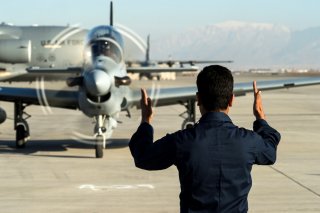The Taliban Has Captured the Air Force America Built for Afghanistan—Though Some Afghan Pilots Escaped
The fate of the Taliban’s aviation will depend on how generous aid is from its patrons Pakistan and Qatar.
The turboprop-engine Super Tucanos, built by Brazil’s Embraer and U.S. company Sierra Nevada, superficially resemble World War II fighter planes with their .50 caliber machine guns and thirty-four-hundred-pound bomb load. But they incorporate relatively modern navigation and targeting systems, possess the endurance for eight-hour patrols and in theory are cheap to operate, if less so in practice.
Realistically, if the Taliban can get the A-29 Super Tucano in the air, lack of training and servicing will use the aircraft’s more advanced capabilities, though of course, they could still perform strikes with unguided weapons. Finding necessary spare parts could also prove difficult, though neighboring Turkmenistan operates A-29 Super Tucanos. Turkmenistan historically doesn’t like the Taliban, but spare parts might be acquired via corruption and smugglers.
What Next?
The Taliban will likely have its hands full maintaining control of Afghanistan. The deposed vice president is attempting to organize an anti-Taliban resistance force in the Panjshir Valley, and the Taliban may continue to combat Islamic State elements too. Thus, the Taliban will likely seek to wield air power against these adversaries, just as the AAF did against the Taliban. If the Taliban can acquire the large cargo planes, then these could also give it airlift capability with which to transport volunteers, supplies, and weapons from abroad.
However, finding or training new pilots and mechanics will be a huge challenge, as will acquiring spare parts, fuel, and munitions needed to keep aircraft flying over the long term. Thus, the fate of the Taliban’s aviation will depend on how generous aid is from its patrons Pakistan and Qatar, its success in striking deals with hesitant but profit-minded countries like China, Russia, and Turkey, and ability to coerce or convert skilled Afghan pilots and mechanics to enter its service.
Sébastien Roblin holds a Master’s Degree in Conflict Resolution from Georgetown University and served as a university instructor for the Peace Corps in China. He has also worked in education, editing, and refugee resettlement in France and the United States. He currently writes on security and military history for War Is Boring.
Image: Reuters.

